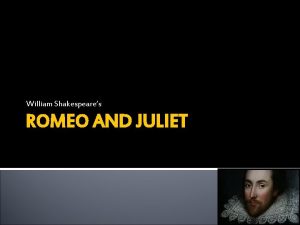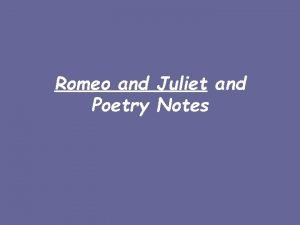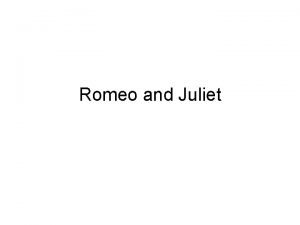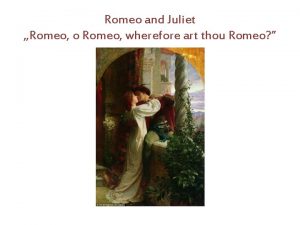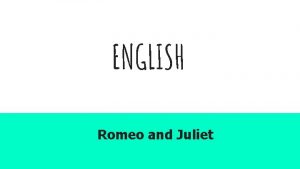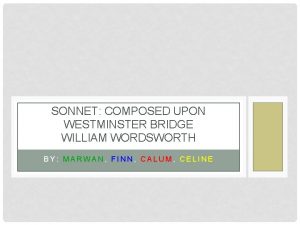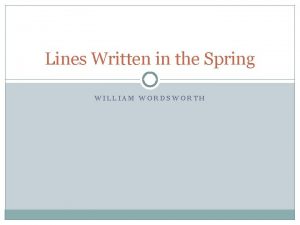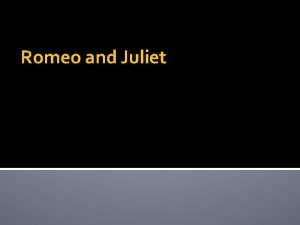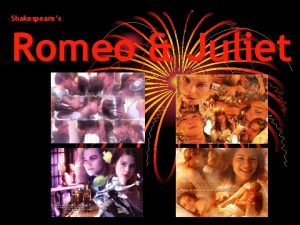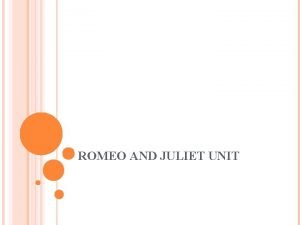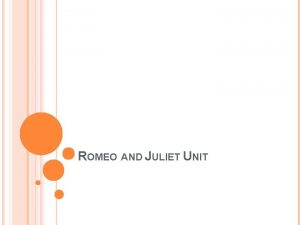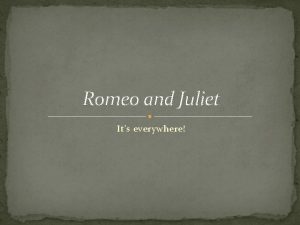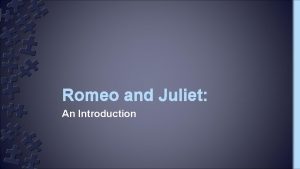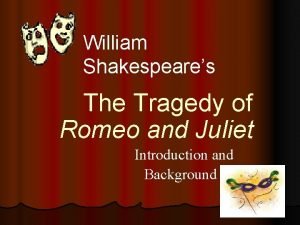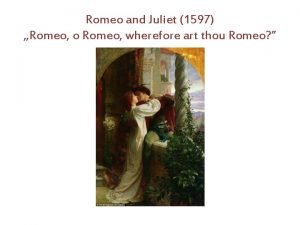William Shakespeares ROMEO AND JULIET Romeo Juliet Written
























- Slides: 24

William Shakespeare’s ROMEO AND JULIET


Romeo & Juliet Written in London, England in 1595 when Shakespeare was only 26 years old. The story is about ‘a pair of star-crossed lovers’. The play is about feuding families, sword fights, disguise, misunderstandings, balls, tragedy, humour and of course romance.

The Prologue The prologue to the play is a sonnet. It has 14 lines, with rhyming endings every other line, ending with a rhyming couplet. This means that the endings of every other line rhyme. As you listen to the Prologue, you are to draw whatever images come into your head on the back of your A 4 sheet. Then, in pairs, you have ten minutes to try to write a modern English version of the Prologue.

The Houses – Capulet & Montague TWO HOUSEHOLDS, BOTH ALIKE IN DIGNITY, IN FAIR VERONA (WHERE WE LAY OUR SCENE), FROM ANCIENT GRUDGE BREAK TO NEW MUTINY, WHERE CIVIL BLOOD MAKES CIVIL HANDS UNCLEAN. FROM FORTH THE FATAL LOINS OF THESE TWO FOES A PAIR OF STAR-CROSSED LOVERS TAKE THEIR LIFE; WHOSE MISADVENTURED PITEOUS OVERTHROWS DOTH WITH THEIR DEATH BURY THEIR PARENTS` STRIFE. THE FEARFUL PASSAGE OF THEIR DEATH-MARKED LOVE, AND THE CONTINUANCE OF THEIR PARENTS` RAGE, WHICH BUT THEIR CHILDRENS` END NOUGHT COULD REMOVE, IS NOW THE TWO HOURS` TRAFFIC OF OUR STAGE; THE WHICH IF YOU WITH PATIENT EARS ATTEND, WHAT HERE SHALL MISS, OUR TOIL SHALL STRIVE TO MEND.

The Setting – VERONA th 14 century Italy


The Capulets Juliet Capulet Lady Capulet Lord Capulet Juliet’s Nurse Tybalt Capulet (Juliet’s cousin) Sampson & Gregory (servants)

The Montagues Romeo Montague Lady Montague Lord Montague Benvolio Montague (Romeo’s cousin) Mercutio (Romeo’s best mate) Abraham & Balthasar (servants)

Other Characters Prince Escalus (related to Mercutio) Paris (Juliet’s suitor & related to Prince Escalus) Apothecary (in the play but not in the movie) Friar Laurence Friar John (in the play but not in the movie)

Character Activity Act One, Scene One Girls are to write down what we’ve learned about the Capulet characters so far. Boys are to write down what we’ve learned about the Montague characters so far. Focus on behaviour, personality, situation etc.

The CAPULETS – (girls)

The MONTAGUES – (boys)

Romeo Phrase/Line What this means to the audience. . . Juliet Phrase/Line What this means to the audience. . .

Figurative Language Alliteration Personification Metaphor Onomatopoeia Simile Hyperbole Find examples of the following figurative language devices from the play. How do these examples position the reader to feel? How do certain images evoke particular emotions in the reader?

ALLITERATION “desire doth in his death” “i have a faint cold fear thrills through my veins that almost freezes up the heat of life” “oh single soled jest, solely singular for the singleness!” “good Peter to hide her face for her fans the fairer face”

PERSONIFICATION “arise fair sun and kill the envious moon” “two of the most fairest stairs in all the heaven” “death is my son-in-law, death is my heir” “back foolish tears, back to your native spring” “venus smiles not in a house of tears” “it seems she hangs upon the cheek of night”

METAPHOR “her eyes were in the heavens and the stars were in her head” “they have made worm’s meat of me” “with love’s light wings that i o’erproach these walls for stony limits cannot hold love out” “it is the east and Juliet is the sun” “alak there lies more peril in your eyes than twenty of your swords”

ONOMATOPOEIA “chinks” “hiss’d” “gallop” “groane’d”

SIMILE “that my lips are like two blushing pilgrims” “my bounty is as boundless as the sea” “a bump on her forehead as big as a rooster’s comb” “he carries himself like a dignified gentleman” “he pricked like thorn” “scaring the ladies like a crow keeper” “that he’s like a bud bitten by a deadly worm” “bring you a rope like those used on ships” hmmm “spawn like a dry herring”

HYPERBOLE “with purple fountains issuing from your veins” “adding to the clouds, more clouds with his deep sign” “tis not so deep as a well, nor so wide as a church door, but tis enough” “yet i should kill thee with much cherishing” “i flew over the wall of the wings of love” “thus i enforce thy rotten jaws to open” “having some business do not entreat her eyes” “well if our wits are on a wild goose chase i am done for” “and to’t they go like lightning for ere i could draw part to them” “that quenched the fire of your pernicious rage” “this night is a thousand times worse without your light” “will your tears wash him out of his grave”


Get Creative. . . What To Do 1. Break students up into groups of three. 2. Give each group a line of figurative language from the balcony scene, written on a 5 x 7 index card. These lines are provided in the handout below. 3. Each group has three minutes to plan how they will represent the ideas as charades for the rest of the class. 4. When the students are ready, have each small group act out its line, while the rest of the class guesses. 5. When the audience has finished guessing (successfully or not), ask a member of the group to write the line on the board. 6. Wrap up with a discussion on the power of the images in the balcony scene. Ask the students to identify specific examples of different figures of speech. 7. As an extension, ask the students to identify the speaker of each line, Romeo or Juliet. Then see if the students can successfully sequence the lines written on the board in the order in which they appear in the scene. It might be fun to do these extra activities before working on the balcony scene in class.

 William shakespeares romeo and juliet
William shakespeares romeo and juliet Themes of jealousy
Themes of jealousy Shakespeare's tragedy about racism and jealousy
Shakespeare's tragedy about racism and jealousy Romeo and juliet script romeo romeo where
Romeo and juliet script romeo romeo where Shakespeare career
Shakespeare career Themes of hamlet
Themes of hamlet Shakespeare idioms
Shakespeare idioms Onomatopoeia romeo and juliet
Onomatopoeia romeo and juliet Romeo
Romeo During the _____ of the play, romeo is banished.
During the _____ of the play, romeo is banished. The tragedy of romeo and juliet by william shakespeare
The tragedy of romeo and juliet by william shakespeare William shakespeare romeo and juliet summary
William shakespeare romeo and juliet summary William shakespeare wrote romeo and juliet
William shakespeare wrote romeo and juliet Facts about romeo
Facts about romeo Romeo and juliet tbc
Romeo and juliet tbc Balthasar romeo and juliet character traits
Balthasar romeo and juliet character traits Romeo and juliet script oh romeo i've missed you
Romeo and juliet script oh romeo i've missed you Key quotes romeo and juliet act 1 scene 1
Key quotes romeo and juliet act 1 scene 1 The luncheon
The luncheon Hamlet was written by william shakespeare
Hamlet was written by william shakespeare William wordsworth sonnet 14
William wordsworth sonnet 14 Lines written in early spring theme
Lines written in early spring theme The elevator by william sleator plot diagram
The elevator by william sleator plot diagram Shortest drama of shakespeare
Shortest drama of shakespeare Unhappy fortune by my brotherhood
Unhappy fortune by my brotherhood







